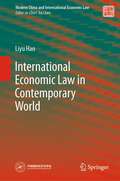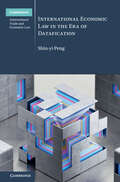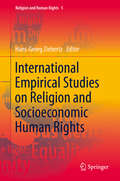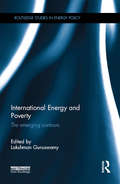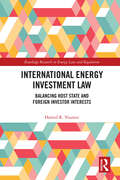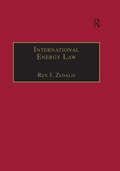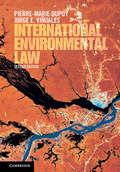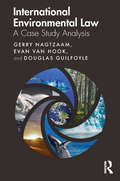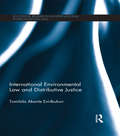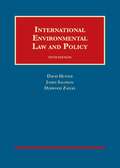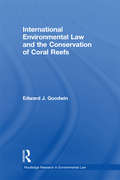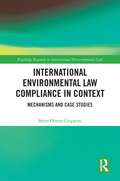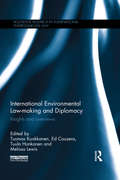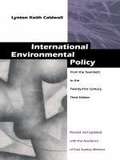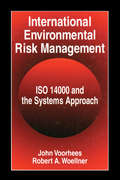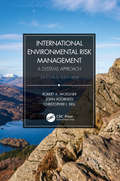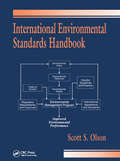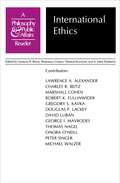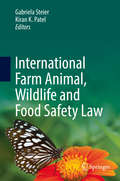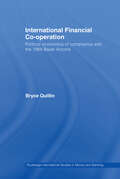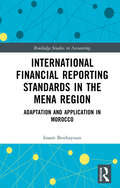- Table View
- List View
International Economic Law and National Autonomy
by Meredith Kolsky Lewis Susy FrankelInternational commitments may sit uneasily with national pressures in the best of times. This age of economic uncertainty brings these tensions into sharper relief. This volume draws together thirteen analyses of this tension in a wide array of contexts, including each of the three main pillars of the World Trade Organization, international investment law and arbitration, and the international financial institutions. The essays feature internationally recognised experts addressing topical examples of international economic law obligations clashing with domestic political interests. For example, Professor Robert Howse, of New York University Law School, addresses issues of globalization and whether international and national interests can in today's world be considered separate, while Ko-Yung Tung, the former Director-General of the World Bank, looks at trends in investment treaty arbitration and considers what the future may hold in light of the recent financial crisis, the rise of China as an economic powerhouse, and other factors.
International Economic Law in Contemporary World (Modern China and International Economic Law)
by Liyu HanThis book focuses on the real themes in various areas of international economic law and explores the key elements behind the written rules. The advantage of this approach is that these themes or elements apply to all types of countries, whether developed or developing, whether market-based or not, and to trade, investment, or other transactions.This book reflects the author's thoughts and views on international economic law and its application based on his experience advising government departments and entities, particularly insights into the U.S.-China trade war from the perspective of a Chinese scholar. This feature makes the book very different from other books published before the U.S.-China trade war or textbooks that simply introduce the relevant subjects and provokes readers to think deeply about the relevant issues.
International Economic Law in the Era of Datafication (Cambridge International Trade and Economic Law)
by Shin-yi PengThis book addresses the challenges of datafication through the lens of international economic law. We are undergoing a wave of datafication practices. If such practices simply continue to evolve without being examined and repaired along the existing path of development, the same issues will continue to accumulate and will more than likely be amplified. The unprecedented economic and social influence of big tech has served as the catalyst for the concept of 'digital sovereignty,' which is rooted in the need to safeguard regulatory autonomy in a datafied world. The current wave of data-driven innovations has placed the policy debates on digital trade and data governance into an even more challenging context. The book – whose chapters are connected by the many facets of 'data' - systematically explains how international economic law can reduce the perils of datafication instead of enhancing them. This title is part of the Flip it Open Programme and may also be available Open Access. Check our website Cambridge Core for details.
International Empirical Studies on Religion and Socioeconomic Human Rights (Religion and Human Rights #5)
by Hans-Georg ZiebertzSocioeconomic rights include rights with regard to social security, labour and employment, as well as cultural rights which may be regarded as a shield for the protection of human dignity, especially of specific groups, such as women, children and refugees. The enforceability of socioeconomic rights clearly distinguishes them from other rights. These rights need, perhaps more than others, the support of civil society. Because states have leeway in how resources are distributed, civil society has a major impact on what resources are used to fulfil socio-economic rights. One of the actors in the public arena are religious traditions, respective Churches. Most of them have developed ethical standards for individual conduct and rules for living together in society based on their basic scriptures. All three monotheistic religions, Judaism, Christianity, and Islam, are marked by a caring engagement for the poor, the sick, the old and the foreign. From an empirical perspective, the general research question of this volume is how young people understand and evaluate socioeconomic rights and to which degree religious convictions and practices are connected with attitudes towards these human rights. Can religion be identified as a force supporting the human rights regime and which additional concepts strengthen or weaken the consent to these rights? The richness of empirical data contributes to a better understanding how socioeconomic rights are legitimated in the opinion of more than 10.000 respondents in 14 countries.
International Energy and Poverty: The emerging contours (Routledge Studies in Energy Policy)
by Lakshman GuruswamyAround 2.8 billion people globally, also known as the "Other Third" or "energy poor", have little or no access to beneficial energy that meets their needs for cooking, heating, water, sanitation, illumination, transportation, or basic mechanical power. This book uniquely integrates the hitherto segmented and fragmented approaches to the challenge of access to energy. It provides theoretical, philosophical and practical analysis of energy for the low energy (non-hydrocarbon based) Other Third of the world, and how the unmet needs of the energy poor might be satisfied. It comprehensively addresses the range of issues relating to energy justice and energy access for all, including affordable - sustainable energy technologies (ASETs). The book breaks new ground by crafting a unified and cohesive framework for analysis and action that explains the factual and socio-political phenomenon of the energy poor, and demonstrates why clean energy is a primary determinant of their human progress. This is a must-read for all scholars, students, professionals and policy makers working on energy policy, poverty, and sustainable energy technologies.
International Energy Investment Law: Balancing Host State and Foreign Investor Interests (Routledge Research in Energy Law and Regulation)
by Hamid R. YounesiThis book analyses relational contract theory within the context of international energy investment agreements.Putting forth an exhaustive assessment of the field, the book provides a pragmatic resolution to the challenges inherent in the relationship between host states and foreign investors. Addressing critical queries confronting legal practitioners, arbitrators, judges, and scholars grappling with contractual imbalances, including the looming threat of expropriation, the book offers comprehensive insights. Balancing the interests of both host states and investors, the volume discusses global case studies which have proven to be efficacious and proposes a solution grounded in existing legal doctrines and practices.The book will be of interest to researchers in the field of energy law, international investment law, and contract theory and law.
International Energy Law: Rules Governing Future Exploration, Exploitation and Use of Renewable Resources
by Rex J. ZedalisThe international legal rules affecting renewable alternative energy resources are amongst the most important legal and environmental concerns of the near future. As traditional energy sources are depleted, new technologies are being developed to harness the potentials of wave, current and tidal energy, coastal wind power, offshore geothermal, polar energy resources and space-based solar collection. This book is the first comprehensive analysis of the legal rules governing the alternative energy resource potential of all international common areas - the high seas, the polar zones (especially Antarctica) and outer space. In a detailed, but precisely analyzed text, the book also reviews the international environmental rules affecting exploration, exploitation and use of internationally situated energy resources, alongside resources located offshore under national jurisdictions. This is accompanied by a critical look at the connection between efforts to control greenhouse gases and the growing interest in non-polluting alternatives found in the international "commons . The result is a work of unprecedented value for environmental and international law academics and practitioners, as well as those interested in environmental resource economics and politics.
International Environmental Law
by Dupuy, Pierre-Marie and Viñuales, Jorge E. Pierre-Marie Dupuy Jorge E. ViñualesThis textbook provides a concise, conceptually clear, and legally rigorous introduction to contemporary international environmental law and practice. Written in an accessible style, the book covers all the major multilateral environmental agreements, paying particular attention to their underlying structure, their main legal provisions, and their practical operation. The material is structured into four sections: (I) Foundations, (II) Substantive regulation, (III) Implementation, and (IV) International environmental law as a perspective. The presentation of the material blends policy and legal analysis and makes extensive reference to the relevant treaties, instruments and jurisprudence. All chapters include a detailed bibliography along with numerous figures to summarise the main components of the regulation. It covers emerging topics such as foreign investment and the environment, environmental migration, climate change and human rights, technology diffusion, and environmental security in post-conflict settings.
International Environmental Law: An Introduction
by Pierre-Marie Dupuy Jorge E. ViñualesInternational Environmental Law offers a concise, conceptually clear, and legally rigorous introduction to contemporary international environmental law and practice. The book covers all major environmental agreements, paying particular attention to their underlying structure, main legal provisions, and practical operation. It blends legal and policy analysis, making extensive reference to the jurisprudence and scholarship, and addressing the interconnections with other areas of international law, including human rights, humanitarian law, trade and foreign investment. The material is structured into four sections - foundations, substantive regulation, implementation, and influence on other areas of international law - which help the reader to navigate the different areas of international environmental law. Each chapter includes charts summarising the main components of the relevant legal frameworks and provides a detailed bibliography. Suitable for practicing and academic international lawyers who want an accessible, up-to-date introduction to contemporary international environmental law, as well as non-lawyers seeking a concise and clear understanding of the subject.
International Environmental Law: A Case Study Analysis
by Gerry Nagtzaam Evan van Hook Douglas GuilfoyleThis book seeks to better understand how International Environmental Law regimes evolve. The authors address throughout the major environmental, economic, and political tensions that have both shaped and constrained the evolution of international environmental policy within regimes, and its expression in international legal rule and norm development. Readers will gain an increased understanding of the growing role played by non-state actors in global environmental governance, including environmental non-government organisations, scientists, the United Nations, and corporations. The authors also look ahead to the future of International Environmental Law, evaluating key challenges and decisions that the discipline will face. The text is clear, concise, and accessible. It is ideally suited to students and professionals interested in International Environmental Law, and individuals who are intrigued by this dynamic area of law.
International Environmental Law and Distributive Justice: The Equitable Distribution of CDM Projects under the Kyoto Protocol (Routledge Research in International Environmental Law)
by Tomilola Akanle Eni-IbukunThe Clean Development Mechanism (CDM) is widely regarded as one of the Kyoto Protocol’s best creations and as an essential part of the international climate change regime. The CDM has been constantly evolving to ensure that it fulfils its objectives of mitigating climate change and contributing to sustainable development in developing countries. The over 6,000 registered projects under the CDM are estimated to have generated almost US$200 billion of investment in developing countries and are expected to achieve GHG emission reductions of about 6.8 billion tonnes. Nevertheless, the CDM is not perfect, and one of its main problems is the inequitable geographic distribution of projects among developing countries. Understandably, this is a problem that countries are very keen to address, and since 2001, even before the first project was registered, countries have been highlighting the need to ensure that projects are equitably distributed among participating countries. This book looks at distributive justice under the CDM regime and focuses on the issue of equity in the geographic distribution of CDM projects among developing countries. The book investigates relevant aspects of international law to identify the legal characteristics of equitable distribution or distributive justice, in order to establish what equitable distribution in the CDM should look like. Based on these investigations, Tomilola Akanle Eni-Ibukun breaks new ground in defining equitable distribution under the CDM and exploring how key obstructions to the equitable distribution of projects may be overcome. The book will be of particular interest to academics and policymakers of climate change and the CDM within international law.
International Environmental Law And Policy (University Casebook)
by David Hunter James Salzman Durwood ZaelkeThe most widely adopted text in the field, this comprehensive, multidisciplinary casebook analyzes all aspects of international environmental law and policy, including the major environmental treaty regimes, customary law principles and the development and evolution of soft law norms. It emphasizes the dynamic nature of the law-making process, including global environmental diplomacy and the critical role of non-state actors, including scientists, NGOs, and business. It presents the binding norms of international environmental law, and explains how international cooperation facilitates and strengthens global environmental governance through setting national priorities, coordinating bilateral and multilateral science, financing, technology sharing, and capacity building.
International Environmental Law and the Conservation of Coral Reefs (Routledge Research in International Environmental Law)
by Edward J. GoodwinTropical coral reefs are important ecosystems. They are economically important to coastal communities living in predominantly developing countries, and also provide shoreline protection, catalyse land formation enabling human habitation, act as a carbon sink and are a repository for genetic and species diversity rivalling rainforests. In the face of mounting man-made pressure from pollution, climate change and over-exploitation, these ecosystems increasingly need action to be taken to ensure their conservation and long term sustainable development. International Environmental Law and the Conservation of Coral Reefs breaks new ground by providing the first in-depth account of the ways in which multilateral environmental treaty regimes are seeking to encourage and improve the conservation of tropical coral reef ecosystems. In so doing, the work aims to raise the profile of such activities in order to reinforce their status on the environmental agenda. The book also has wider implications for international environmental law, arguing that sectorial legal action, provided it remains co-ordinated through a global forum that recognises and reflects the inter-connections between all elements of the natural environment, is the most effective way for international law to enhance the conservation of certain habitats. This book will be invaluable to environmental lawyers, legal researchers, marine conservationists and other stakeholders in coral reefs.
International Environmental Law and the Global South
by Alam, Shawkat and Atapattu, Sumudu and Gonzalez, Carmen G. and Razzaque, Jona Shawkat Alam Sumudu Atapattu Carmen G. Gonzalez Jona RazzaqueThe unprecedented degradation of the planet's vital ecosystems is among the most pressing issues confronting the international community. Despite the proliferation of legal instruments to combat environmental problems, conflicts between rich and poor nations (the North-South divide) have compromised international environmental law, leading to deadlocks in environmental treaty negotiations and noncompliance with existing agreements. This volume examines both the historical origins of the North-South divide in European colonialism as well as its contemporary manifestations in a range of issues including food justice, energy justice, indigenous rights, trade, investment, extractive industries, human rights, land grabs, hazardous waste, and climate change. Born out of the recognition that global inequality and profligate consumerism present threats to a sustainable planet, this book makes a unique contribution to international environmental law by emphasizing the priorities and perspectives of the global South.
International Environmental Law Compliance in Context: Mechanisms and Case Studies (Routledge Research in International Environmental Law)
by Belen Olmos GiupponiThis book explores how compliance with international environmental law has changed over time, offering a critical analysis of its current shifting patterns. Beginning with an overview of compliance with international environmental law, the book goes on to explore in detail: compliance in the different legal regimes instituted by Multilateral Environmental Agreements (MEAs), the addition of new subjects of international law, the legal relations between developed and developing countries, and the emergence of new compliance mechanisms in global environmental law. The analysis takes two key developments into consideration: the evolution in forms of compliance and non-state involvement in compliance with international environmental law. In the final section, three case studies are provided to demonstrate how these changes have occurred in selected areas: climate change, biodiversity and water resources. Throughout the book, topics are illustrated with extracts from specific international environmental law jurisprudence and relevant international environmental law instruments. In doing so, the book offers a comprehensive analysis of compliance with international environmental law, providing original insights and following a clear and systematic structure supported by reference to the sources. This book will be of interest to professionals, academics and students working in the field of compliance with international environmental law.
International Environmental Law-making and Diplomacy: Insights and Overviews (Routledge Research in International Environmental Law)
by Tuomas Kuokkanen Ed Couzens Tuula Honkonen Melissa LewisBringing together contributions from diplomats, UN agency officials, lawyers and academics, this book provides insight into the evolution of international environmental law, diplomacy and negotiating techniques. Based on first-hand experiences and extensive research, the chapters offer a blend of practice and theory, history and analysis, presenting a range of historical episodes and nuances and drawing lessons for future improvements to the processes of law-making and diplomacy. The book represents a synthesis of the most important messages to emerge from the annual course on Multilateral Environmental Agreements, delivered to diplomats and negotiators from around the world for the last decade by the University of Eastern Finland and the United Nations Environment Programme. The book will be of interest as a guide for negotiators and as a supplementary textbook and a reference volume for a wide range of students of law and environmental issues.
International Environmental Policy: From the Twentieth to the Twenty-First Century
by Paul Stanley Weiland Lynton Keith CaldwellIn this newly revised and expanded edition of the award-winning International Environmental Policy, Lynton Keith Caldwell updates his comprehensive survey of the global international movement for protection of the environment. Serving as a history of international cooperation on environmental issues, this book focuses primarily on the development of international agreements and institutional arrangements--both governmental and nongovernmental--along with the impact of science, technology, trade, and communication on environmental policy. With implications for multinational commerce, population policy, agriculture, energy issues, biological and cultural diversity, transnational equity, ideology, and education, this book takes a broad view of the policy outcomes of what may be the most important social movement of the 20th century, and addresses the events and politics that have significantly affected the movement over the last twenty years and will continue to affect it into the next century.
International Environmental Risk Management: ISO 14000 and the Systems Approach
by John Voorhees Robert A. WoellnerInternational Environmental Risk Management: ISO 14000 and the Systems Approach gives readers an extensive analysis of practical applications of ISO 14000 and environmental compliance management systems. It offers a mixture of technical engineering advice, legal guidance, and common-sense business acumen. The authors explain the essentials of the standards - how they are being developed and what implications they present - and then discuss cost-benefit analyses, integration strategies, business risk control measures, litigation avoidance and legal expense reduction, and step-by-step guidance on achieving third-party certification.
International Environmental Risk Management: A Systems Approach
by Robert A. Woellner John Voorhees Christopher L. BellBased on the first edition with extensive analysis of practical applications of environmental risk management and compliance management systems, this second edition of International Environmental Risk Management reflects updates made in the understanding and application of risk management best practices and makes available a frame of reference and systematic approach to environmental and social governance (ESG). It provides a pathway for readers to implement environmental management strategies that can be integrated with core operations and other risk management efforts, including supporting sustainability and corporate social responsibility initiatives associated with climate change, the circular economy or supply chain conditions, as well as enterprise risk management; anti-bribery, and other compliance management systems. This book provides in-depth discussions of ways to use global environmental management standards. New features in this edition: Combines EMS standards with discussion of specific principles, other authors’ research, and guidelines on management practices. Provides guidelines on how to prepare for, anticipate, and resolve environmental issues. Includes easily understandable information for all readers and is not simply aimed toward individuals who are knowledgeable about this topic. Provides in-depth discussions on using global environmental management standards to manage risk and promote resilience, as well as legal strategies and voluntary initiatives that companies can utilize to minimize risk. Accounts for the substantive revisions in ISO 14001:2015. As a growing and rapidly changing field, it is necessary to address new issues, guidelines, and regulations to assist businesses, academia, students, consultants, lawyers, and environmental managers with a pragmatic resolution to environmental risk management issues. This second edition gives a broad and detailed analysis of the changes made to international standards and practices and serves as an excellent guide to managing environmental risk.
International Environmental Standards Handbook
by Scott S. OlsonLack of knowledge about, and noncompliance with, international standards can result in loss of sales and partnership opportunities as well as possible legal action. The International Environmental Standards Handbook provides the necessary historical background to understand the current status of international environmental standards. It contains copies of available treaties and provides coverage of laws and standards. The book offers strategies for designing and implementing environmental systems that will be internationally accepted. It includes a list of information sources and a directory of international environmental organizations.
International Ethics: A Philosophy and Public Affairs Reader (Philosophy and Public Affairs Readers #3)
by Lawrence A. AlexanderThis book is comprised of essays previously published in Philosophy & Public Affairs and also an extended excerpt from Michael Walzer's Just and Unjust Wars.
International Family Law: An Introduction
by Barbara StarkInternational law has become part of everyday family law practice, as lawyers everywhere are confronted with questions regarding the rights of 'mail-order' brides, the adoption of children from other countries, the abduction of children by foreign parents, and domestic violence victims seeking asylum. Indeed, globalization is transforming family law, even as families themselves are being redefined. This book provides a practical overview of such issues and also examines the ways in which culture shapes family law in different countries. It provides students with a useful introduction to challenging, complicated and fascinating issues in international family law. Finally, by incorporating a comparative perspective, it gives readers an opportunity to re-examine their own legal systems.
International Farm Animal, Wildlife and Food Safety Law
by Gabriela Steier Kiran K. PatelThis volume is an inspiring and breakthrough piece of academic scholarship and the first of its kind featuring a comprehensive reader-friendly approach to teach the intricacies of the various aspects of international farm animal, wildlife conservation, food safety and environmental protection law. The selected focus areas are grouped in sections, such as agrobiodiversity, fishing and aquaculture, pollinators and pesticides, soil management, industrial animal production and transportation, and international food trade. Farm animal welfare, environmental protection, biodiversity conservation, and food safety are the core of the selected chapters. Every chapter provides real-world examples to make the complex field easy to understand. With its systematic approach, this book is devoted to anyone interested in the subject, becomes a valuable resource for professionals working in food regulation, and provides a solid foundation for courses and master's programs in animal law, environmental policy, food and agriculture law, and regulation of these subjects around the world. Through its emphasis on sustainable food production, this work offers a cutting-edge selection of evolving topics at the heart of the pertinent discourse. As one of its highlights, this books also provides "Tools for Change," a unique compilation and analysis of laws from the major farm animal product trading nations. With these tools, practitioners, advocates, policy makers and other state-holders are equipped with information to start work toward improving farm animal welfare, wildlife conservation, and food safety through the use of law and policy.
International Financial Co-Operation: Political Economics of Compliance with the 1988 Basel Accord (Routledge International Studies In Money And Banking Ser. #Vol. 47)
by Bryce QuillinThe Basel Accord - now commonly referred to as "Basel I" - has exerted a profound influence on international financial politics and domestic prudential financial sector regulatory policy yet great controversy has always surrounded the Accords impact on the safety and competitiveness of the worlds largest financial institutions and the evolution o
International Financial Reporting Standards in the MENA Region: Adaptation and Application in Morocco (Routledge Studies in Accounting)
by Issam BenhayounIn the ever-evolving landscape of global economics, accounting stands as the universal language of business. This book explores the vital role of accounting in articulating economic, social, and environmental activities. It provides a detailed comparison among Moroccan GAAP, IFRS, and US GAAP, highlighting the challenges and opportunities of harmonizing accounting standards in the context of Morocco's unique business environment.Each chapter is crafted to offer practical guidance and technical insights. From property, plant, and equipment (IAS 16) to intangible assets (IAS 38), leases (IAS 17), and inventory valuation (IAS 2), International Financial Reporting Standards in the MENA Region: Adaptation and Application in Morocco covers essential standards with a focus on their real-world applications. Special emphasis is placed on the preparation of cash flow statements (IAS 7), a crucial aspect often overlooked in the Moroccan accounting framework.Through practical case studies and comparative analyses, readers will gain a comprehensive understanding of the principles governing financial statements and the importance of transparency and investor confidence. This book is an indispensable resource for accounting professionals, academics, and anyone interested in the global standardization of financial reporting.

